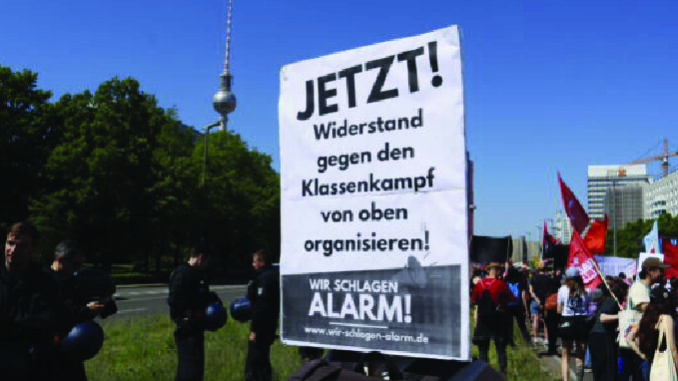
This is the text of a leaflet by Sol, the CWI in Germany, which has been distributed through the workers’ and trade union movement since May Day.
Hardly a day goes by without representatives of employers’ associations, the conservative CDU/CSU and liberal FDP, as well as pro-capitalist economists and journalists, calling for “economic” reforms. This is just a euphemism for further attacks on social rights and the living standards of the working population in order to increase the profits of capitalists. Trade unions, the left and social movements must oppose this with massive resistance.
Economic crisis
The background is the crisis of the capitalist economy. Germany is moving between recession (decline in economic output, such as 0.3 per cent in 2023) and stagnation (the IMF expects growth of just 0.2 per cent for 2024). This is part of the decline of the capitalist system worldwide. The owners of banks, corporations and companies want the majority of the population to pay for this – the wealth of the few is the poverty of the many!
What is the threat?
There seems to be no limit to the bosses’ dreams. Among other things, they are demanding:
– a reduction in corporate taxes
– extending and flexibilising working hours
– reduction of social benefits
– sanctions for those who receive social benefits
– worsening of pensions, such as an increase in pension contributions, the abolition of early retirement at age 63 and an increase in the retirement age
– restrictions on the right to strike
Dreams of the future?
But it is not their dream only for the future, because cuts are already being made at all levels. The next budget cuts, which will lead to further restrictions, are threatened in 2025. Not least, many local authorities are facing large deficits, which will lead to cuts in youth development, popular sports, cultural institutions, etc.
At the same time, expenditure on the armed forces is being massively increased so that German corporations can assert their interests worldwide. Once again, it is clear that rearmament and social cuts are two sides of the same coin.
Appeal or fight?
The trade unions, together with social and environmental organisations, have now published an appeal to the federal government, in which they speak out against cuts, in favour of investment and an end to the ‘debt brake’ (which constitutionally limits unbalanced budgets). The appeal is much too limited in content and is primarily concerned with Germany’s competitiveness, but at least they seem to have recognised where the journey is heading. But appeals to the government will achieve nothing. What is needed is mass mobilisation, resistance and strikes!
An action plan is needed!
We suggest the following:
– an information campaign in all companies and in the public domain, through company and trade union meetings, mass leaflets, poster campaigns
– organising local, regional and national action conferences that bring together trade union and other activists and draw up an action plan
– such an action plan could begin with decentralised and workplace-based actions and lead to a major demonstration in Berlin via local and regional demonstrations
– this situation must lead to the trade unions fighting for a political strike and making it clear that a 24-hour general strike will be organised unless cuts and attacks are abandoned
What to fight for?
A campaign like this can only be successful if it is fought for demands that are worth fighting for. These must be demands that aim to really get to grips with capital, instead of improving the conditions for profit for the capitalists, as DGB (German Trade Union Federation) chairwoman Fahimi does, or demanding limited state investment, as other union leaders do. Instead, the trade unions must finally initiate a radical change of course away from the policy of social partnership. The Sol proposes the following demands, among others:
– No to any cuts or reductions in the rights of workers – hands off the right to strike
– A massive increase in taxes on the profits and assets of banks, corporations and the super-rich
– For the abolition of the debt brake
– For billions to be invested in education, health, climate and social issues – instead of billions for the Bundeswehr (the German armed forced)
– Re-municipalisation and expansion of hospitals, public transport, housing associations under democratic control and management
– Nationalisation of the energy sector under democratic control and administration to stop price increases for the majority of the population and to carry out an ecological energy transition without loss of jobs
The trade union leaders are hoping that the SPD in the federal government will prevent the worst attacks on the rights of workers. But to hope for this is naive. It was the SPD, together with the Greens, that brought us the Agenda 2010 and Hartz IV (see below), and it also pursues a policy in the interests of capitalism, just like the CDU/CSU and FDP. It may be that the weak ‘traffic light’ coalition government will not be able to implement a new Agenda 2030, as demanded by many capitalists. But that does not mean that it will not implement noticeable cuts, and above all, it will only mean that sooner or later there will be a change of government in the interests of the capitalists.
That is why we are sounding the alarm and calling for trade union resistance now!
A political alternative is needed
But to assert their interests, the working class needs its own strong party, a workers’ party with a socialist programme. Such a party could unite the many different struggles and movements and direct them against the cause of social problems – the capitalist system. Because only when the economy and the state no longer function in the interests of maximising the profits of a few, but in the interests of people and nature, can these problems be solved. That is why we are fighting for a socialist and democratic transformation of society. To this end, Sol members are active in the trade unions, the Left Party and social movements. We invite you to join us!
Sol supports the call “We are raising the alarm”
Initiated by Sol trade union members and other activists the following appeal has been signed by more than 500 trade unionists so far:
The federal government has decided on austerity measures that will hit large sections of the population hard – whether in terms of rising electricity, petrol and gas prices, harsh sanctions on the citizen’s income, less money for investment in rail transport and public transport. But this is just the beginning. Representatives of German capitalism are thinking out loud about far-reaching attacks and an “economic agenda”: they are making demands such as the reduction of corporate taxes, the extension and further flexibilisation of working hours, the limitation of social security contributions, the deterioration of the pension system and restrictions on the right to strike. The only additional money available, apart from corporate subsidies, is for the rearmament of the Bundeswehr. This is further confirmation that rearmament and social cuts are two sides of the same coin.
Employees and trade unions must resolutely oppose this class struggle from above in alliance with social movements.
In the trade unions, we are committed to formulating opposition at every level, organising resistance and building local, regional and national networks against the impending far-reaching attacks. To this end, action conferences should be convened to discuss a joint action plan for protests, including a national demonstration, for example, to demand the following:
No to any cuts or reductions in public services
No to restrictions on democratic rights – hands off the right to strike
For a massive increase in taxes on the profits and assets of banks, corporations and the super-rich
For billions to be invested in education, health, climate and social issues – instead of billions for armament and militarisation
We declare our willingness to initiate and participate in corresponding initiatives from below.
The fight against Agenda 2010
When Germany was considered the “sick man of Europe” at the beginning of the 2000s and big business, as it does today, demanded far-reaching social and labour market reforms, the then SPD/Green government under Gerhard Schröder took an axe to the social security systems. With the Agenda 2010 and the Hartz laws, it organised the biggest attack on the social rights of the working class since the end of the Second World War.
At first, the trade union leaders had participated in the government-appointed commissions to draft these laws instead of organising serious resistance from the outset. In spring 2003, they organised a few token protests and then made it clear that they would not go any further.
It was then-SAV members (Sol was formed in 2019 from the SAV and continues its political tradition as the German section of the Committee for a Workers’ International) who argued in trade unions and social movements for the resistance against Agenda 2010 to be taken further onto the streets. At an action conference, activists came together and called for a nationwide demonstration in Berlin on 1 November 2003. With the support of left-wing trade unionists, in particular the ver.di district of Stuttgart, 100,000 people were then mobilised.
“The trade union bosses were amazed and would have liked to have been at the lectern. 100,000 dissatisfied people got the organisers of the Berlin protest march against the government reforms on their feet, ten thousand more than the trade union federation was able to motivate at the end of May,” wrote the Stuttgarter Zeitung at the time. This demonstration was the trigger for workplace protests in the following months, for the Monday demonstrations movement and for trade union demonstrations with half a million participants in spring 2004.
Even if the situation back then cannot be transferred one-to-one to today, there are still some parallels and should also apply today: if the trade union leadership blocks the protest, left-wing trade unionists and activists have a duty to do everything they can to organise resistance to the impending attacks from below.
Some of the first signatories of the appeal say:

“Of course, every cent of wages means lost profit for capital, and of course every crisis is used to divide the wage-dependent and exploit their existential fears to dismantle every obstacle to these profits. This was the case during the financial crisis of 2007 and afterwards, as well as when Agenda 2010 was established. It is time for us to use these experiences to go on the offensive in good time this time.”
Mag Wompel, LabourNet Germany

“With the current budget cuts, funding for the expansion of the rail network has already been withdrawn. This affects employees as well as rail users, and it is also completely the wrong direction, because rail transport should actually be massively expanded as an alternative to individual transport for environmental reasons.”
Rainer Perschewski, works council and member of the federal executive board of the EVG

“I think it’s wrong that the government is sticking to the debt brake while continuing to invest in armaments. In hospitals, patients are suffering more and more unnecessary complications because there is far too little staff, whether it’s nursing staff, doctors or cleaning staff. The workloads are so high that more and more people are leaving the profession. At the same time, private hospital operators are making huge profits. Health care should not be a source of profit, but should be used to provide health care for everyone! Hamburg sold off its municipal hospitals, and now the same thing is happening with the port of Hamburg. In the future, some of the profits will no longer be used for projects such as day care centres or schools, but will remain with the investor MSC!”
Kirsten Rautenstrauch, active in the “Hamburg Alliance for More Staff in Hospitals”, former works council member at Asklepios Klinik Hamburg.
 “In recent years, employees have begun to strike for better working conditions, especially in the public services, in the face of the immense increase in work pressure and poor pay. In these areas, unlike in the case of armament, further cuts are being made and at the same time restrictions on the right to strike are now being debated. The trade unions must prepare for a serious defence against such attacks.”
“In recent years, employees have begun to strike for better working conditions, especially in the public services, in the face of the immense increase in work pressure and poor pay. In these areas, unlike in the case of armament, further cuts are being made and at the same time restrictions on the right to strike are now being debated. The trade unions must prepare for a serious defence against such attacks.”
René Arnsburg, member of the ver.di Berlin-Brandenburg district executive committee.

